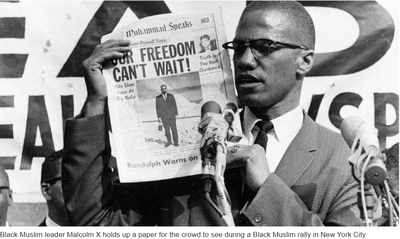Mini-Webquest MLK vs Malcolm X - Malcolm X


Malcolm X, born Malcolm Little on May 19, 1925, in Omaha, Nebraska, experienced a turbulent early life marked by racial violence and hardship. His father, a preacher and supporter of Marcus Garvey's Black nationalist movement, was killed under suspicious circumstances, likely by white supremacists. This event, along with the family's struggles against systemic racism, shaped Malcolm's early views on race and power.
As a young man, Malcolm became involved in criminal activities, including drug dealing, gambling, and burglary. This period of his life, spent in the streets of Boston and Harlem, was marked by violence and crime, earning him the nickname "Detroit Red" for his involvement in gang life. In 1946, he was arrested and sentenced to prison for burglary. While incarcerated, Malcolm underwent a profound transformation (source: The Autobiography of Malcolm X).
During his imprisonment, Malcolm was introduced to the teachings of the Nation of Islam (NOI) through letters from his family. He embraced the Nation’s beliefs, particularly its emphasis on Black self-reliance, separatism, and rejection of white society. Upon his release in 1952, Malcolm dropped his "slave name" Little and adopted "X" to symbolize his lost African identity.
As a leader in the NOI, Malcolm X advocated for Black empowerment, racial pride, and a more militant stance in the fight for civil rights. He rejected the nonviolent approach of leaders like Martin Luther King Jr. and argued that Black people had the right to defend themselves “by any means necessary” against the violent oppression of white supremacy (source: Malcolm X: A Life of Reinvention by Manning Marable). His early speeches reflected this militancy, with a strong emphasis on self-defense and resistance to white domination.
Malcolm’s transformation continued after his 1964 pilgrimage to Mecca, where he embraced Sunni Islam and moderated some of his views on race, advocating for global human rights and unity. However, his early life of violence and militancy played a significant role in shaping his philosophy and his role in the civil rights movement.
Malcolm X was assassinated on February 21, 1965, but his legacy of Black empowerment and his critique of racial injustice continue to influence social justice movements today.
Sources:
- Haley, Alex, and Malcolm X. The Autobiography of Malcolm X. Ballantine Books, 1965.
- Marable, Manning. Malcolm X: A Life of Reinvention. Penguin Books, 2011.